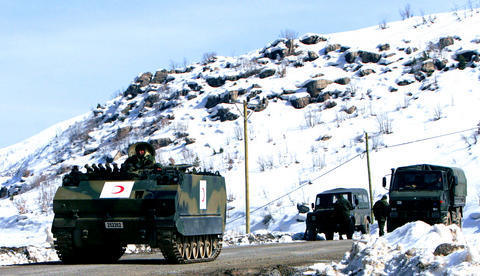Truckloads of Turkish troops, many of them weary and unshaven, returned from Iraq on Friday as Turkey ended a cross-border offensive against Kurdish rebels after eight days, meeting US demands for a quick campaign. Washington and Baghdad welcomed the move, but Turkish officials warned they would send forces back into Iraq if they deemed it necessary.
A key test of the effectiveness of Turkey's ground incursion could come in the weeks ahead with the arrival of spring, the traditional start of the fighting season of the rebel Kurdistan Workers' Party (PKK).
In the past, guerrillas have taken advantage of the melting snows and infiltrated Turkey from bases in Iraq, and any surge in PKK attacks could trigger another tough response from the Turkish military.

PHOTO: AP
"It is very clear that an established group like the PKK will not be eliminated with one or two more cross-border operations. Turkey needs pinpoint operations against the group's leadership, like Israel's operations against Palestinian groups," said Sinan Ogan, head of the Turkish Center for International Relations and Strategic Analysis in Ankara.
However, the discrimination and poverty that triggered the Kurdish insurgency in Turkey in 1984 persist, although the government has taken steps in recent years to ease restrictions on Kurds as part of its bid to join the EU. The PKK's power has dwindled since its 1990s heyday and Europe and the US consider it a terrorist group, but it still enjoys support in the country's predominantly Kurdish southeast and some urban centers.
The PKK has tempered its demands over the years, initially calling for an independent state and later for autonomy in the southeast and cultural rights. The conflict has killed up to 40,000 people.
Turkey's first major incursion into Iraq in about a decade reflected the sensitive nature of its alliance with the US, which provided intelligence to the Turkish military but sought a short campaign to preserve the relative calm of the mostly Kurdish region of northern Iraq.
The troop withdrawal came a day after US President George W. Bush and Secretary of Defense Robert Gates told Turkish leaders that they should end the offensive as soon as possible.
"Any influence, either foreign or domestic, on this decision by the Turkish Armed Forces is out of the question," the Turkish military said in a statement. "Terrorist activities in Iraq's north will be observed in the future and no threat against Turkey from this region will be allowed," it said.
General Yasar Buyukanit, the military chief, said it was "pure coincidence" that the withdrawal was announced one day after Gates issued his appeal during a visit to Ankara, Dogan news agency reported.
"This decision was made because the operation had reached its targets," Buyukanit said. ``When the US defense secretary stepped into Turkey, the withdrawal had been partly realized."
CNN-Turk TV quoted Prime Minister Recep Tayyip Erdogan as saying: "Everything has been realized according to the plan. No civilian has been harmed in the operation."

Eleven people, including a former minister, were arrested in Serbia on Friday over a train station disaster in which 16 people died. The concrete canopy of the newly renovated station in the northern city of Novi Sad collapsed on Nov. 1, 2024 in a disaster widely blamed on corruption and poor oversight. It sparked a wave of student-led protests and led to the resignation of then-Serbian prime minister Milos Vucevic and the fall of his government. The public prosecutor’s office in Novi Sad opened an investigation into the accident and deaths. In February, the public prosecutor’s office for organized crime opened another probe into

RISING RACISM: A Japanese group called on China to assure safety in the country, while the Chinese embassy in Tokyo urged action against a ‘surge in xenophobia’ A Japanese woman living in China was attacked and injured by a man in a subway station in Suzhou, China, Japanese media said, hours after two Chinese men were seriously injured in violence in Tokyo. The attacks on Thursday raised concern about xenophobic sentiment in China and Japan that have been blamed for assaults in both countries. It was the third attack involving Japanese living in China since last year. In the two previous cases in China, Chinese authorities have insisted they were isolated incidents. Japanese broadcaster NHK did not identify the woman injured in Suzhou by name, but, citing the Japanese

RESTRUCTURE: Myanmar’s military has ended emergency rule and announced plans for elections in December, but critics said the move aims to entrench junta control Myanmar’s military government announced on Thursday that it was ending the state of emergency declared after it seized power in 2021 and would restructure administrative bodies to prepare for the new election at the end of the year. However, the polls planned for an unspecified date in December face serious obstacles, including a civil war raging over most of the country and pledges by opponents of the military rule to derail the election because they believe it can be neither free nor fair. Under the restructuring, Myanmar’s junta chief Min Aung Hlaing is giving up two posts, but would stay at the

YELLOW SHIRTS: Many protesters were associated with pro-royalist groups that had previously supported the ouster of Paetongtarn’s father, Thaksin, in 2006 Protesters rallied on Saturday in the Thai capital to demand the resignation of court-suspended Thai Prime Minister Paetongtarn Shinawatra and in support of the armed forces following a violent border dispute with Cambodia that killed more than three dozen people and displaced more than 260,000. Gathered at Bangkok’s Victory Monument despite soaring temperatures, many sang patriotic songs and listened to speeches denouncing Paetongtarn and her father, former Thai prime minister Thaksin Shinawatra, and voiced their backing of the country’s army, which has always retained substantial power in the Southeast Asian country. Police said there were about 2,000 protesters by mid-afternoon, although